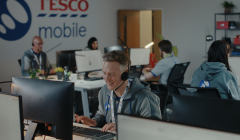
Tesco Mobile and BBH London use humour to showcase the network’s connectivity
‘It Pays to be Connected’ reaches consumers with relatable circumstances

Adjusting to lockdown is about far more than getting the right technology in place; our weekly series examines how the industry can come together to navigate the new normal.

From furloughed creatives launching pro-bono agencies to offer up free creative advice to charities, to the plethora of pro-bono creative work popping up on donated media space, the past few weeks have not been short of reassuring reminders of the power of creativity in crisis. Both as individuals and employers, the Coronavirus crisis has seen creativity blossom amidst a bleak backdrop.
When both personally and professionally so many certainties have slipped away, it is vital that we don’t confuse the time we have spent in lockdown with comfort with it. From prioritising mental health to recognising the personal challenges employees are facing, the new normal we find ourselves in demands constant vigilance and questioning.
At a time when it is harder than ever to predict the long-term impact of the crisis on everything from consumers’ purchasing habits to the long-term impact of the creative industries, open-sourcing innovation and insight has never been more important. With that in mind we asked a selection of industry leaders how they are navigating the new normal.
A principle isn’t a principle until it costs you something. Today, you can prove your values to your staff.
Rania Robinson

One of the things we’ve tried to do is to remember that staff, clients and customers don’t forget how you behaved in challenging times. It’s important to keep a long-term perspective. As much as it might make good business sense to put staff on furlough, or to make pay cuts or redundancies, we are trying to put these decisions off for as long as possible as you can understand the impact this can have on people’s lives.
There is a saying that a principle isn’t a principle until it costs you something. Today, you can prove your values to your staff.
Admittedly, we are perhaps more protected than some. We have not lost all of our business overnight. We can afford to be more generous. The impact on us, so far, I would say has been manageable.
And, of course it depends what state your business was in before this happened. If you were in a healthy position, you have more time. We have clients who have healthy businesses that are even more relevant during this time, like Zoflora disinfectant, and Young’s Seafood, which, like all the frozen sector, is doing well because it can be bought and stored in bulk.
We ourselves, coming from a production company mentality operate lean and scale up and down as needed. We were lucky enough to have won a lot of new business at the back end of last year and had completed the majority of our productions. So yes, while we will all feel the impact of this, a production abroad has been cancelled, one client has put activity on hold due to challenges with distribution, a pitch has been postponed, we are in a position to take a wait and see approach.
We want to try to support our staff as much as we can, so that they feel as little impact as possible. But I appreciate not every business is in this fortunate position and would find it difficult to be this generous. It’s important to find the balance that allows you to sustain your business over the next few months but also to come out the other side of all this in the best possible shape. You will not be a sustainable business anymore, if you make too many or the wrong sort of cuts during this time. So, it’s important not to lose sight of that long-term view.
We have furloughed a few members of staff on full pay. We may need to look at more as time goes on but we’re pitching at the moment and that always gives you reason to be optimistic.
Whilst many businesses will have little choice but to make more drastic decisions, there will be businesses that will take a hard-line view, even if they can afford not to. They won’t be thinking about the long-term impact this is likely to have on their staff motivation and trust.
Being decent and supportive engenders loyalty. In turn, staff will be supportive back. It makes good business sense to ensure you have motivated staff, to ensure they feel looked after in the long-term. As a boutique agency we are like a family and we recognise that our staff have commitments that a change in their circumstances could have a very adverse effect on. Let alone the emotional fall-out.
We also don’t want to lose good people and go through the disruption and cost of re-hiring at a later stage for a short-term fix.
In a business that’s all about relationships and original thinking, it isn’t just a case of a like for like replacement of people.
That’s why, we’re being very cautious about the decisions we make now and thinking through how they will impact the business in the long run, when things do eventually get back to normal. Whatever that ends up looking like.
This is the time for brands to have a long, hard look at themselves and cut the crap.
Sophie Lewis

If ever there was a time to reflect and consider, on a personal, societal and brand level, what we’re all doing here, that time is now.
I don’t like the recent-ish use of the word ‘purpose’ to describe a worthy, socially justifiable reason for existence, usually in the context of a brand.
We all know the correct definition:
1. The reason for which something is done or created or for which something exists
And I have spent many happy hours, probably months, or possibly even years if you added up all the workshops, debating purpose for brands. Everything from biscuits to drinks to clothing to…you name it, I’ve considered it.
But right now, still in the thick of this global pandemic and at the top of the curve in relation to the progression of the situation in the UK, this is the time for brands to have a long, hard look at themselves and cut the crap.
Here’s a thought. Let’s not go back. Let’s not just pick up where we left off in April. Let’s not start buying a load of stuff we don’t need. Let’s not start flying everywhere. Let’s not start undervaluing those jobs that turn out, shock horror, to be the ones that actually keep our society going.
And as for brands, how about we don’t return to the pretence we’ve all been complicit in. The overstatement of brands roles in societies and peoples’ lives. Let’s stop peddling the transformative powers of oh, I don’t know, that cup of coffee, that shower gel.
Hey, maybe we should even start making and selling something completely different?
Perhaps we’d be able to do something better for everyone with someone else. With a partner. With a brand we used to pit ourselves against. Imagine it.
And is this a return to local? To actually knowing the people we live near. To standing with them, helping them on an ongoing basis. Will the globalisation trend we’ve been a part of just reverse? Will brands be forced to understand and be a part of small communities to be really relevant and credible.
This will be survival of the fittest for brands. And that doesn’t mean survival for the ones that keep spending on communications. It means the ones that have genuine value for people, however small and everyday, can recognise their value, without adding copious amounts of hyperbole and are credible and useful to us in the new world we will emerge into.
Will compassion and empathy continue in our society and business? Will it be business as usual or business as unusual?
Ben Whattam

As I sit at my makeshift home office, it’s hard not to be reflective. One moment led me back to a Financial Times article I was sent after the 2009 crisis, drawing parallels between Darwin’s Theory of Evolution and business (Hodgson and Knudsen).
Never more than now has such a phrase captured the attention, and sleepless nights, that survival really is the objective.
One particular insight I’ve found inspiring ever since I read the associated book, and one I’ve leant on over more since the start of this forced misadventure, is this:
“As a result, key Darwinian ideas such as mutual aid, sympathy and co-operation have often been ignored by later writers on business and economics,” from Darwin’s Conjecture: The Search for General Principles of Social and Scientific Evolution by Geoffrey Hodgson and Thorbjørn Knudsen.
As a service industry, every agency is dependent on its clients for survival, but symbiotically, the client is dependent on the services provided by the agency.
Perhaps a forbidden truth that must never be spoken?
However, I believe the principles of mutual aid, sympathy and co-operation have existed for agency and client long before this crisis, albeit out-of-sight, but often as the exception and not the rule. For us though, they have proven to result in our most progressive client relationships.
Our hope in navigating this ‘new normal’ will magnify this conversation, that agencies, like their clients, need to seek sympathy and mutual aid for survival. A discourse that is not seen as weakness, but one that demonstrates transparency and trust which can lead to long term benefits for both.
And if survival is tenable, then giving back is possible.
‘Keko Kares’ has been an initiative that seeks to give back and make a difference in the community around our offices. It is as dependent on the individuals and culture of the agency, as it is the resources made available to it. And now more than ever, our culture is demonstrating that survival and sympathy do go hand in hand.
Empathy at Keko will continue long after Covid-19 has left the headlines, but will compassion and empathy continue in our society and business? Will it be business as usual or business as unusual?
Of course, my hope is the former, and I know I’m not alone. As Claire Beale, Global Editor in Chief at Campaign, says, “We need to move on from the procurer/supplier mentality that has dictated the rules of marketer/agency engagement for so long and redefine what a client/agency partnership really looks like in order to work together to secure livelihoods and find true, useful and lasting purpose for this industry.”
Be it food, holidays, fashion or news, we will buy it from a brand we trust.
Emma de la Fosse

I can’t tell you what the new normal is going to look like and anyone who claims to be able to do so is a charlatan. Which takes me swiftly to a prediction that I do have confidence in: truth will be our most valuable divining rod in navigating the new normal.
Corona has enforced a special and rare thing, a pause en-masse, of the kind last seen during the great industrial manufacturing years when the ‘Factory Fortnight’ saw millions of workers all take the same two weeks holiday in August, a point I was reminded of recently when reading Rory Sutherland’s excellent article ‘Breaking the Cycle’. Back then, everyone returned to work at the same time with renewed energy, objectivity and a willingness to re-set if necessary. Today’s enforced ‘Factory Fortnight’ is giving society the same opportunity to reflect. When we all re-emerge from our bunkers people may have re-framed their view of the world somewhat and have different ideas about what is important.
I don’t think we will see some kind of mass epiphany as some are predicting. A world war that lasted five years and took millions of lives didn’t change us from being the acquisitive creatures we are. But we have gone ‘Back to the Future’ and experienced a step back in time, akin perhaps to the world we inhabited 70 years ago. Walking to the shops, queuing up, shortages here and there, cooking for real, no fancy restaurants or overseas holidays, getting to recognise faces in the local community, green spaces, fresh air, nature. We have also had a bitter taste of what happens when you mess with Mother Earth: COVID 19.
Yes, we’ve all had a big shock. And when we are scared, we look for reassurance in things we can trust. Trust has been in short supply of late and the slew of misinformation and downright lies on social media around Coronavirus has thrown the problem into sharp relief. We don’t quite know who or what to believe. And we, the ad industry, are complicit.
Matt Rivitz, Founder of Twitter account Sleeping Giants which blew the whistle on the dangers of programmatic media helping prop- up extremist propaganda sites says, “By failing to enforce their own rules, ad networks like Google and Facebook’s Audience Network, have allowed not only hate and harassment to thrive, but disinformation and conspiracies, both of which are running rampant in our current health crisis.”
Programmatic media uses data to automatically place the ads we make for brands on sites without their knowledge. In effect, brands ad budgets are unwittingly helping to fund platforms that allow the spread of untrustworthy content.
This is a huge problem and not just because of the fakery and skewed viewpoints that are being spread around. For a brand it is more fundamental than that.
Brands originally came about to solve a trust problem. Customers could not trust that the loose ingredients they were buying from their corner store, such as flour, hadn’t been cut with something cheap and nasty. A brand name gave them the assurance that they were buying reliable, quality produce. Fast forward to 2020 and we are in a situation where the very household names who are supposed to be beacons of trust are associated with people who are anything but.
Brands who want to win in a post-COVID world could do worse than to get back to what people really value them for: honesty and integrity. This is where we should focus our own efforts too.
Agencies used to be incredibly valuable to their clients because, in a sea of noise and complexity, they could filter out the nonsense and identify the right thing they should be doing: the Jiminy Cricket Agency on Brand Pinocchio’s shoulder. An agency would be brave enough to advise their high street banking clients that holding back payments to small business during this crisis and charging extortionate interest rates for loans would do long term damage to their brand. Instead, we seem to be just advising them to make meaningful, sincere and sympathetic ads #sombrepiano, with the odd freebie for key workers thrown in.
In a post-COVID trust vacuum, the brands people can trust will win. With unemployment, pay cuts and furloughing, fewer purchases of greater quality may become the new norm. We may take one good holiday a year rather than a dozen mini breaks, choose clothes that last more than one season or pay for a subscription to a newspaper brand with salaried journos. And when we buy less, who we buy from is more important. So be it food, holidays, fashion or news, we will buy it from a brand we trust.
Looks like you need to create a Creativebrief account to perform this action.
Create account Sign inLooks like you need to create a Creativebrief account to perform this action.
Create account Sign in